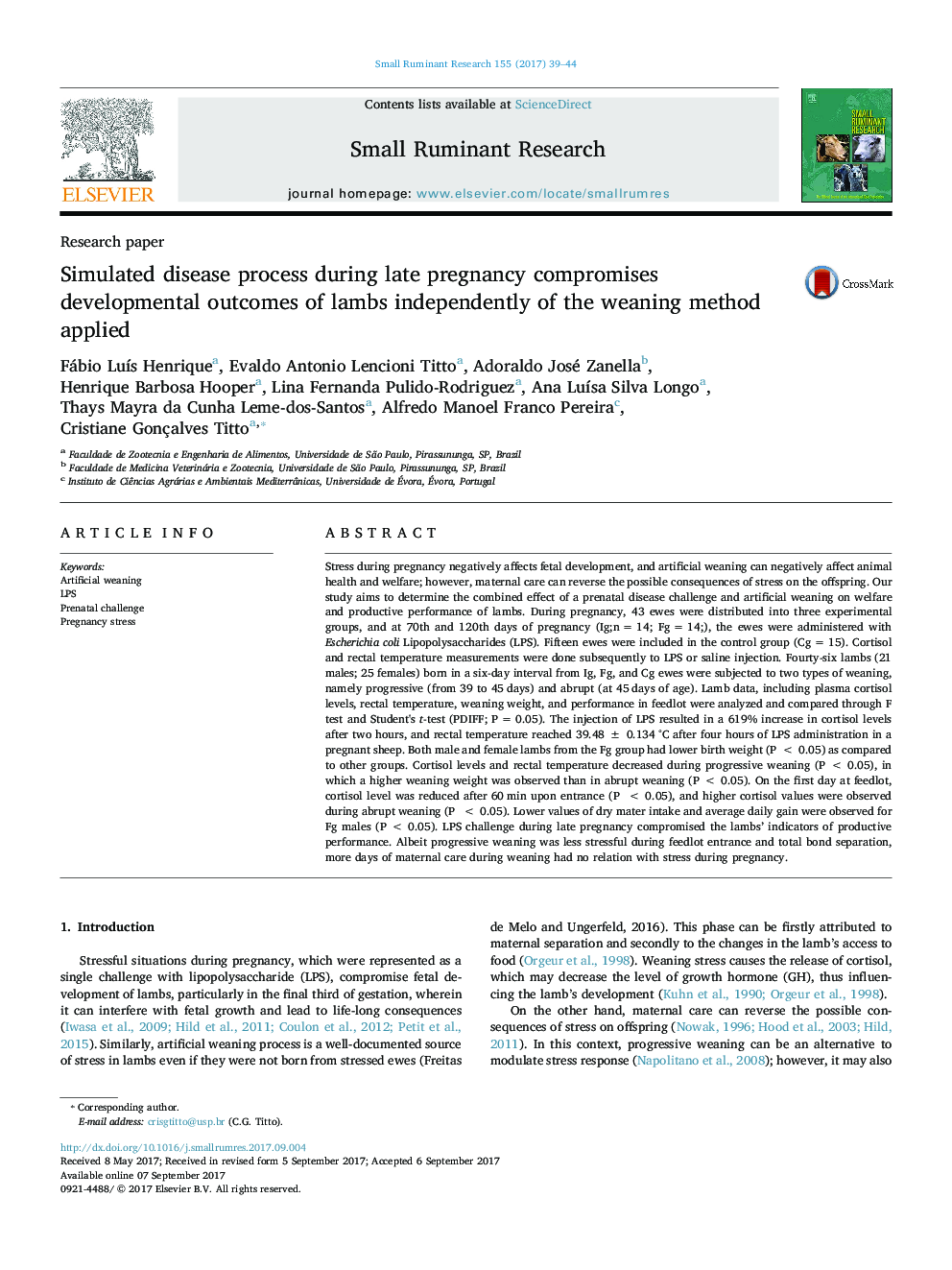| کد مقاله | کد نشریه | سال انتشار | مقاله انگلیسی | نسخه تمام متن |
|---|---|---|---|---|
| 5544132 | 1554337 | 2017 | 6 صفحه PDF | دانلود رایگان |
عنوان انگلیسی مقاله ISI
Simulated disease process during late pregnancy compromises developmental outcomes of lambs independently of the weaning method applied
ترجمه فارسی عنوان
روند شبیه سازی بیماری در دوران بارداری در دوران بارداری، به طور مستقل از شیوه شستشو استفاده می شود
دانلود مقاله + سفارش ترجمه
دانلود مقاله ISI انگلیسی
رایگان برای ایرانیان
کلمات کلیدی
موضوعات مرتبط
علوم زیستی و بیوفناوری
علوم کشاورزی و بیولوژیک
علوم دامی و جانورشناسی
چکیده انگلیسی
Stress during pregnancy negatively affects fetal development, and artificial weaning can negatively affect animal health and welfare; however, maternal care can reverse the possible consequences of stress on the offspring. Our study aims to determine the combined effect of a prenatal disease challenge and artificial weaning on welfare and productive performance of lambs. During pregnancy, 43 ewes were distributed into three experimental groups, and at 70th and 120th days of pregnancy (Ig;n = 14; Fg = 14;), the ewes were administered with Escherichia coli Lipopolysaccharides (LPS). Fifteen ewes were included in the control group (Cg = 15). Cortisol and rectal temperature measurements were done subsequently to LPS or saline injection. Fourty-six lambs (21 males; 25 females) born in a six-day interval from Ig, Fg, and Cg ewes were subjected to two types of weaning, namely progressive (from 39 to 45 days) and abrupt (at 45 days of age). Lamb data, including plasma cortisol levels, rectal temperature, weaning weight, and performance in feedlot were analyzed and compared through F test and Student's t-test (PDIFF; P = 0.05). The injection of LPS resulted in a 619% increase in cortisol levels after two hours, and rectal temperature reached 39.48 ± 0.134 °C after four hours of LPS administration in a pregnant sheep. Both male and female lambs from the Fg group had lower birth weight (P < 0.05) as compared to other groups. Cortisol levels and rectal temperature decreased during progressive weaning (P < 0.05), in which a higher weaning weight was observed than in abrupt weaning (P < 0.05). On the first day at feedlot, cortisol level was reduced after 60 min upon entrance (P  < 0.05), and higher cortisol values were observed during abrupt weaning (P  < 0.05). Lower values of dry mater intake and average daily gain were observed for Fg males (P < 0.05). LPS challenge during late pregnancy compromised the lambs' indicators of productive performance. Albeit progressive weaning was less stressful during feedlot entrance and total bond separation, more days of maternal care during weaning had no relation with stress during pregnancy.
ناشر
Database: Elsevier - ScienceDirect (ساینس دایرکت)
Journal: Small Ruminant Research - Volume 155, October 2017, Pages 39-44
Journal: Small Ruminant Research - Volume 155, October 2017, Pages 39-44
نویسندگان
Fábio LuÃs Henrique, Evaldo Antonio Lencioni Titto, Adoraldo José Zanella, Henrique Barbosa Hooper, Lina Fernanda Pulido-Rodriguez, Ana LuÃsa Silva Longo, Thays Mayra da Cunha Leme-dos-Santos, Alfredo Manoel Franco Pereira,
